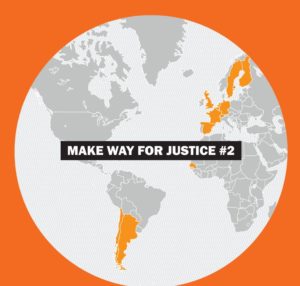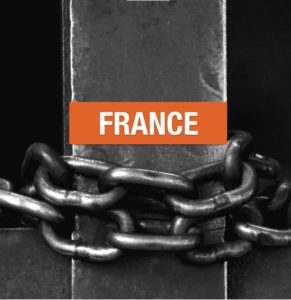 NGOs TRIAL, FIBGAR, ECCHR and FIDH publish for the second consecutive year their annual report on universal jurisdiction. Make way for Justice #2 reviews criminal cases which have, in 2015, involved this groundbreaking but underused principle.
NGOs TRIAL, FIBGAR, ECCHR and FIDH publish for the second consecutive year their annual report on universal jurisdiction. Make way for Justice #2 reviews criminal cases which have, in 2015, involved this groundbreaking but underused principle.
2015 has seen the opening of the most anticipated trial of our time, that of former Chadian dictator Hissene Habre. After 30 years of impunity, he has finally been judged for the atrocities he has inflicted on his people. This historical trial could not have taken place without a unique legal tool: universal jurisdiction.
Thanks to this principle, States can – under certain conditions – prosecute the authors of international crimes, regardless of the place where these crimes were committed or the nationality of the victims and perpetrators.
TRIAL, FIBGAR, ECCHR and FIDH make daily use of universal jurisdiction to defend victims of international crimes and fight impunity. Today, this expertise leads these NGOs to publish their second annual report of the topic, Make way for Justice #2.
12 countries under scrutiny
In this report, 40 cases illustrate the developments of universal jurisdiction in 2015: the atrocities perpetrated by Boko Haram in 2014, the crimes committed in Syria since 2011, the repression of Bahrein’s demonstrations in 2010 and many others.
This study reviews 12 countries – from Sweden to Chile and from France to Senegal – who have opened inquiries, indicted or judged suspects of the most serious crimes thanks to universal jurisdiction. It also reports setbacks, such as the closing of several ongoing inquiries in Spain.
Fighting impunity using universal jurisdiction
A lot remains to be done for justice to triumph. In spite of its potential, universal jurisdiction is still insufficiently used by States reluctant to jeopardize their economic or diplomatic interests.
Engaged in favor of a strong international justice, TRIAL, FIBGAR, ECCHR et FIDH hope that Make way for Justice #2 will give legal practitioners, media representatives, NGOs and human rights defenders a better understanding of universal jurisdiction, so that this tool can finally become a strong lever in the fight against impunity.
READ Universal Jurisdiction Annual Report 2016 HERE
READ REPORT 2015 HERE



